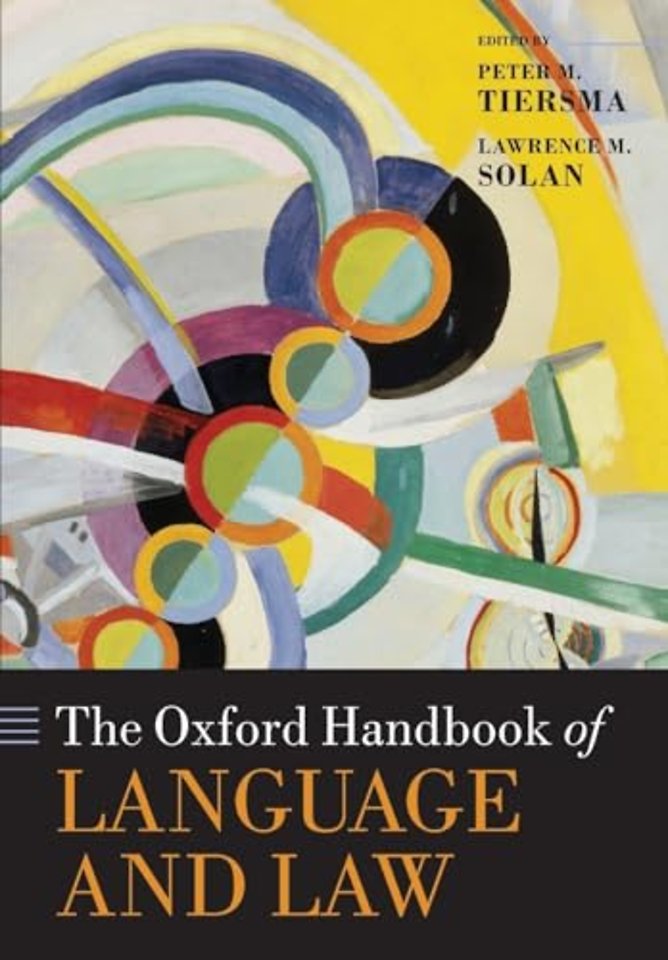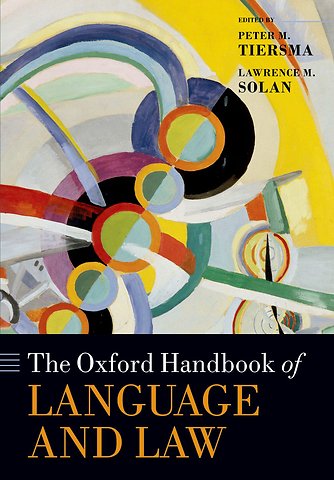The Oxford Handbook of Language and Law
Samenvatting
This book provides a state-of-the-art account of past and current research in the interface between linguistics and law. It outlines the range of legal areas in which linguistics plays an increasing role and describes the tools and approaches used by linguists and lawyers in this vibrant new field. Through a combination of overview chapters, case studies, and theoretical descriptions, the volume addresses areas such as the history and structure of legal language, its meaning and interpretation, multilingualism and language rights, courtroom discourse, forensic identification, intellectual property and linguistics, and legal translation and interpretation.
Encyclopaedic in scope, the handbook includes chapters written by experts from every contentint who are familiar with linguistic issues that arise in diverse legal systems, including both civil and common law jurisdictions, mixed systems like that of China, and the emerging law of the European Union.
Specificaties
Inhoudsopgave
1: Peter Tiersma: A History of the Language of the Law
2: Heikki E. S. Mattila: Legal Vocabulary
3: Risto Hiltunen: The Grammar and Structure of Legal Texts
4: Maurizio Gotti: Text and Genre
5: Mark Adler: The Plain Language Movement
Part II: The Interpretation of Legal Texts
6: Lawrence M. Solan: Linguistic Issues in Statutory Interpretation
7: Sanford Schane: Contract Formation as a Speech Act
8: Robert W. Bennett: Constitutional Interpretation
9: Ralf Poscher: Ambiguity and Vagueness in Legal Interpretation
10: Brian H. Bix: Legal Interpretation and the Philosophy of Language
Part III: Multilingualism and Translation
11: Michel Bastarache: Bilingual Interpretation Rules as a Component of Language Rights in Canada
12: Jan Engberg: Word Meaning and the Problem of a Globalized Legal Order
13: Susan Sarcevic: Challenges to the Legal Translator
14: Karen McAuliffe: Language and Law in the European Union
15: Cornelis J. W. Baaij: Fifty years of Multilingual Interpretation in the European Union
Part IV: Language Rights
16: Tove Skutnabb-Kangas: Linguistic Human Rights
17: Peter Tiersma: Language Policy in the United States
18: Durk Gorter and Jasone Cenoz: Legal Rights of Linguistic Minorities in the EU
19: Tunde Olusola Opeibi: Investigating the Language Situation in Africa
Part V: Language and Criminal Law
20: Janet Ainsworth: The Meaning of Silence in The Right to Remain Silent
21: Naomi E. S. Goldstein, Sharon Messenheimer, Christina Riggs L. Romaine, and Heather Zelle: Potential Impact of Juvenile Suspects' Linguistic Abilities on Miranda Understanding and Appreciation
22: Frances Rock: The "Caution" in England and Wales
23: Janice Nadler and J. D. Trout: The Language of Consent in Police Encounters
24: Peter Tiersma and Lawrence M. Solan: The Language of Crime
25: Deborah Davis and Richard A. Leo: Interrogation Through Pragmatic Implication: Sticking to the Letter of the Law While Violating Its Intent
Part VI: Courtroom Discourse
26: Gail Stygall: Discourse in the U.S. Courtroom
27: Mami Hiraike Okawara: Courtroom Discourse in Japan's New Judicial Order
28: Liao Meizhen: Courtroom Discourse in China
29: Martha L. Komter and Marijke Malsch: The Language of Trials in an Inquisitorial Criminal Law System
30: Susan Berk-Saligson: Linguistic Issues in Courtroom Interpretation
31: Nancy S. Marder: Instructing the Jury
Part VII: Intellectual Property
32: Roger W. Shuy: Using Linguistics in Trademark Cases
33: Ronald R. Butters: Language and Copyright Law
34: Syugo Hotta and Masahiro Fujita: The Psycholinguistic Basis of Distinctions in Trademark Law
Part VIII: Identification of Authorship and Deception
35: Carole E. Chaski: Authorship Identification in the Forensic Setting
36: Krzysztof Kredens and Malcolm Coulthard: Corpus Linguistics in Authorship Identification
37: David Wools: Detecting Plagiarism
Part IX: Speaker Identification
38: Peter L. Patrick: Language Analysis for Determination of Origin
39: A. Daniel Yarmey: Factors Affecting Lay Person's Identification of Speakers
40: Paul Foulkes and Peter French: Forensic Speaker Comparison
Anderen die dit boek kochten, kochten ook
Net verschenen
Rubrieken
- aanbestedingsrecht
- aansprakelijkheids- en verzekeringsrecht
- accountancy
- algemeen juridisch
- arbeidsrecht
- bank- en effectenrecht
- bestuursrecht
- bouwrecht
- burgerlijk recht en procesrecht
- europees-internationaal recht
- fiscaal recht
- gezondheidsrecht
- insolventierecht
- intellectuele eigendom en ict-recht
- management
- mens en maatschappij
- milieu- en omgevingsrecht
- notarieel recht
- ondernemingsrecht
- pensioenrecht
- personen- en familierecht
- sociale zekerheidsrecht
- staatsrecht
- strafrecht en criminologie
- vastgoed- en huurrecht
- vreemdelingenrecht







